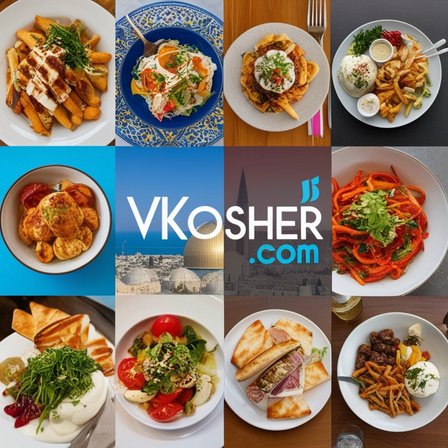Exploring the World of Kosher Cookbooks
Kosher cookbooks are more than just a collection of recipes; they are a gateway to a culinary tradition steeped in history, culture, and religious observance. For centuries, Jewish communities around the world have maintained dietary laws known as kashrut, which dictate what is permissible to eat according to Jewish law. These laws have given rise to a rich tapestry of kosher cuisine, reflecting the diverse backgrounds of Jewish people from different regions. Kosher cookbooks serve as both a guide and an inspiration, helping home cooks navigate these dietary laws while celebrating the flavors of Jewish heritage.
The Essence of Kosher Cooking
Kosher cooking is defined by adherence to kashrut, a set of laws that outline what is considered "fit" for consumption. These laws are derived from the Torah, the central reference of the Jewish religion, and have been interpreted and expanded upon by rabbinical authorities over the centuries. Key principles include the prohibition of mixing meat and dairy, the requirement for animals to be slaughtered in a specific manner, and the exclusion of certain animals, such as pork and shellfish, from the diet. Kosher cookbooks are designed to help cooks create delicious meals within these constraints, often providing innovative solutions to common culinary challenges.
A Journey Through Time: Historical Kosher Cookbooks
The history of kosher cookbooks is as diverse as the Jewish diaspora itself. Early Jewish communities in Europe, the Middle East, and North Africa each developed their own unique cuisines, influenced by the local ingredients and cooking techniques of their surroundings. As these communities migrated, they brought their culinary traditions with them, leading to a fusion of flavors and recipes.
One of the earliest known kosher cookbooks is the "Sefer Mitzvot Gadol," written in the 13th century by Rabbi Moses of Coucy. Although not a cookbook in the modern sense, it contains instructions on how to observe the dietary laws, including recipes for traditional Jewish dishes. Over the centuries, other texts followed, each reflecting the culinary practices of Jewish communities in different regions.
In the 19th and early 20th centuries, as Jewish immigrants settled in the United States, kosher cookbooks began to take on a more modern form. These books often combined traditional recipes with American ingredients and cooking methods, making them accessible to a new generation of Jewish cooks. "The Settlement Cook Book," first published in 1901, is one such example. While not exclusively kosher, it includes many recipes that adhere to kosher dietary laws, reflecting the needs of Jewish housewives at the time.
Modern Kosher Cookbooks: A Blend of Tradition and Innovation
Today, kosher cookbooks are as varied as the communities they serve. From traditional Ashkenazi fare to Sephardic delicacies, modern kosher cookbooks offer a wealth of recipes that cater to a wide range of tastes and dietary needs. These cookbooks are often authored by well-known chefs, food bloggers, and culinary historians, each bringing their unique perspective to the world of kosher cuisine.
One notable trend in contemporary kosher cookbooks is the focus on healthy, plant-based eating. As more people adopt vegetarian and vegan diets, kosher cookbooks have evolved to include recipes that align with these lifestyles. Books like "The Jewish Vegetarian Year Cookbook" by Roberta Kalechofsky and "The Modern Jewish Table" by Tracey Fine and Georgie Tarn offer a fresh take on traditional Jewish dishes, emphasizing the use of whole, unprocessed ingredients.
Another trend is the globalization of kosher cuisine. With Jewish communities in nearly every corner of the globe, kosher cookbooks now feature recipes from countries as diverse as Morocco, India, and Mexico. These books celebrate the rich culinary heritage of Jewish communities worldwide, offering readers a chance to explore new flavors and cooking techniques while adhering to kosher dietary laws.
The Role of Kosher Cookbooks in Jewish Life
Kosher cookbooks play a vital role in preserving Jewish culinary traditions and passing them down to future generations. They are often used to teach children and young adults about the importance of kashrut, as well as the cultural significance of certain dishes. Many Jewish holidays and celebrations are centered around food, and kosher cookbooks provide the recipes needed to create these festive meals.
For example, Passover, one of the most widely observed Jewish holidays, comes with its own set of dietary restrictions in addition to the usual kosher laws. During this time, leavened bread and many grains are prohibited, leading to a unique set of recipes that have been passed down through generations. Kosher cookbooks dedicated to Passover offer a wide range of options, from traditional matzo ball soup to more contemporary dishes like quinoa salad.
Kosher cookbooks also serve as a connection to the past, offering a tangible link to the culinary practices of previous generations. In many families, recipes are handed down from mother to daughter, grandmother to granddaughter, often through the pages of a well-worn cookbook. These books become treasured heirlooms, filled with handwritten notes, stains from countless meals, and the memories of shared meals and celebrations.
The Impact of Kosher Cookbooks on the Broader Culinary World
While kosher cookbooks are primarily written for Jewish audiences, their influence extends far beyond the confines of Jewish kitchens. In recent years, there has been a growing interest in kosher cuisine among non-Jewish food enthusiasts. This is partly due to the increasing popularity of ethnic foods and the rise of the "clean eating" movement, which emphasizes natural, minimally processed ingredients.
Kosher cookbooks have gained a reputation for offering recipes that are not only delicious but also health-conscious. The emphasis on fresh ingredients, coupled with the exclusion of certain additives and preservatives, makes kosher cooking appealing to those looking for a more wholesome approach to food. As a result, many kosher cookbooks have found a broader audience, with some even becoming bestsellers in the general cookbook market.
Moreover, the principles of kashrut have influenced the way people think about food and dietary restrictions. The kosher certification process, which involves rigorous inspections and adherence to strict guidelines, has become a model for other dietary certifications, such as organic and halal. Kosher cookbooks, by extension, have helped to raise awareness about the importance of ethical and sustainable food practices.
The Future of Kosher Cookbooks
As the world of kosher cuisine continues to evolve, so too will kosher cookbooks. The rise of digital media has already begun to change the way people access recipes, with many turning to online platforms for inspiration and guidance. However, there remains a strong demand for printed cookbooks, particularly those that offer more than just recipes.
Future kosher cookbooks are likely to continue the trend of blending tradition with innovation, offering readers a mix of classic and contemporary dishes. They may also place a greater emphasis on storytelling, with authors sharing personal anecdotes and insights into the cultural significance of the recipes they include. Additionally, as dietary preferences and restrictions become more diverse, kosher cookbooks will need to cater to a wider range of needs, offering options for gluten-free, low-carb, and other specialized diets.
In conclusion, kosher cookbooks are a testament to the resilience and adaptability of Jewish culinary traditions. They serve as both a guide and an inspiration, helping cooks navigate the complexities of kashrut while celebrating the rich flavors and cultural heritage of Jewish cuisine. As the culinary world continues to change, kosher cookbooks will undoubtedly remain an essential resource for anyone looking to explore the delicious and diverse world of kosher cooking.




